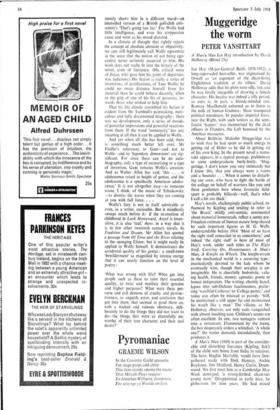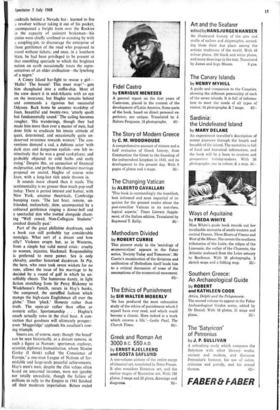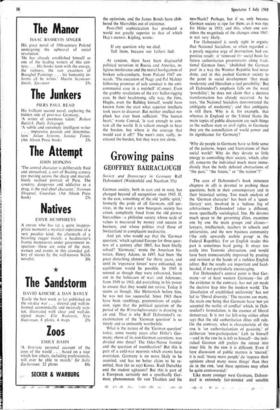Muggeridge the worm
PETER VANSITTAR T Ian Hay (Major-General Beith, 1876-1952), a long-superseded best-seller, was stigmatised by Orwell as 'an exponent of the clean-living Englishman tradition at its silliest.' David Holloway adds that his plots were silly, too, and he was totally incapable of drawing a female character. His heyday was indeed a silly period, as ours is, in part, a bloody-minded one. Ramsay MacDonald exhorted us to listen to the milk of human kindness : Shaw trumpeted political murderers. In popular imperial litera- ture the Right, with such writers as the semi- fascist 'Sapper,' was mesmerised by the dead officers in Flanders, the Left bemused by the Amritsar massacres.
About Baldwin, Malcolm Muggeridge was to wish that he had spent as much energy in getting rid of Hitler as he did in getting rid of his own King. In the present novel, a name- sake appears, in a typical passage, preliminary to some undergraduate hurly-burly. 'Mug- geridge, I don't know you very intimately but I know this, that you always were a worm and a bounder . . . When it comes to disturb- ing our crew, who have to fight the battle of the college on behalf of warriors like you and these gentlemen here whose favourite field- spqrt is probably billiards—well, that's what I call a bit too thick.'
Hay's novels, challengingly public school, in- fluenced by Kipling and tending to refer to 'the Breed,' mildly anti-semitic, sentimental about manorial homesteads, reflect a sunny pre- Freudian estimate of human nature long-shared by such important figures as H. G. Wells, understandable before 1914. 'Most of us have the right stuff concealed in us somewhere,' and indeed 'the right stuff' is hero of most of Hay's work, under such titles as The Right Stuff, Carrying On, Housemaster, A Man's Man, A Knight on Wheels. The knight-errant in the mechanical world is a recurring type : inarticulately devoted to the lady whom he eventually wins, though their sex-play is un- imaginable. He is cheerfully hedonistic, valu- ing health, friends, money; agnostic; prone to honest indignation. The writing, chattily banal, lapses into sub-Dickens facetiousness, prefer- ring 'watchful Cerberus' to 'College porter,' and today can often be misread as parody. 'Still, he maintained a stiff upper lip and maintained his watch like a man.' The villains, as Mr Holloway observes, are only cads vanquished with almost insulting ease. Children's scenes are often excellent. In one, two teenagers venture into a restaurant. Flummoxed by the menu, the boy desperately orders a whitebait. 'A whole one?' the waiter demands incredulously, then produces it.
A Man's Man (1909) is part of the consider- able and disturbing literature (Kipling, Saki) of the child sent home from India to relatives. The hero, Hughie Marrable, would have fore- gathered easily with Dick Hannay, Archie Roylance, Jim Maitland, Henry Curtis, Drum- mond. We first meet him as a Cambridge May Week demi-god, 'a strong-limbed, clean-run young man.' Disappointed in early love, he globe-trots for nine years. 'He had mixed cocktails behind a Nevada bar : learned to fire a revolver without taking it out of his pocket; accompanied a freight train over the Rockies in the capacity of assistant brakeman—his duties were chiefly confined to standing by with a coupling-pin, to discourage the enterprise of those gentlemen of the road who proposed to travel without tickets; and once, in a Southern State, he had been privileged to be present at that ennobling spectacle to which the brightest nation on earth occasionally treats the repre- sentatives of an older civilisation—the lynching of a negro.'
A Coney Island bar-fight to rescue a girl— `Hallo! The hound! This must stop!'—gets him shanghaied into a coffin-ship. Most of the crew desert it in mid-Atlantic with an eye on the insurance, but Hughie remains behind and commands a rigorous but successful Odyssey. Back home he assumes wardship of Joan, beautiful and twenty-two, 'utterly spoilt but fundamentally sound.' The sailing becomes rougher. 'His wanderings, though they had made him more than ever a master of men, had done little to eradicate his innate attitude of quiet, determined, and occasionally quite un- deserved reverence towards women.' The con- ventions demand a cad, a dubious actor 'with dark eyes and dangerous eyelids—one felt in- stinctively that he was a good card-player, and probably objected to cold baths and early rising.' Despite this, an accusation of financial malpractice, and perhaps the clumsiest marriage proposal on record, Hughie of course wins Joan, with a long-lost rich uncle thrown in.
It sounds more absurd than it reads. The sentimentality is no grosser than much pop-stuff today. There is period interest and banter, with New York, amateur theatricals, Cambridge bumping races. 'The last boat, remote, un- friended, melancholy, slow, accompanied by a coloured gentleman ringing a dinner-bell and a spectacled don who trotted alongside chant- ing "Well rowed, Non-Collegiate Students" creaked dismally past.'
Part of the great philistine daydream, such a book can still probably tap considerable nostalgia. What sort of a dream and how silly? Violence erupts but, as in Westerns, from a simple but valid moral crisis: cruelty to women, injustice, blackmail. Responsibility is preferred to mere power. Sex is only chivalry, another historical daydream. In Pip, the hero, who once took seven wickets for no runs, allows the issue of his marriage to be decided by a round of golf in which he un- selfishly cheats. The humorous dandy, in light fiction stretching from Sir Percy Blakeney to Wodehouse's Psmith, recurs in Hay's books, 'the composed, the unruffled fashion which stamps the high-caste Englishman all over the globe.' Then 'pluck.' Honesty rather than truth. The open-air rather than office or esoteric cellar. Sportsmanship . . . Hughie's coach actually rows in the rival boat. A con- viction that goodness will ultimately prosper : even 'Muggeridge' applauds his assailant's row- ing triumph.
Sneers are, of course, easy; though 'the breed' can be seen historically, at a distant remove, in such a figure as Nansen : sportsman, explorer, scientist, diplomat, humanitarian, whom Maxim Gorky (I think) called 'the Conscience of Europe,' a one-man League of Nations of for- midable and large-scale peaceful achievements. Hay's men's men, despite the elite values often based on unearned incomes, were not ignoble nor totally unrealistic, though the failure of millions to rally to the Empire in 1941 finished off their moderate imperialism. Belsen ended
the optimism, and the James Bonds have clob- bered the Marrables out of existence.
Post-1945 sophistication has produced a world not greatly superior to that of which Hay's mentor, Kipling, wrote: If any question why we died, Tell them, because our fathers lied.
At random, there have been disgraceful political terrorism in Russia and America, re- ligious intolerance and the moral hooliganism of broken safe-conducts, from Poland 1947 on- wards. 'The execution of Nagy and Pal Maleter following promises of safe conduct is the anti- communist case in a nutshell' (Camus). Even the grubby revelations of the ETU ballot-rigging case. In their headstrong, silly way, the Jirns, Hughs, even the Bulldog himself, would have known from the start what superior intellects took years to discover. But, neither intellect nor pluck has ever been sufficient. 'The human heart,' wrote Conrad, 'is vast enough to con- tain all the world. It is valiant enough to bear the burden, but where is the courage that would cast it off?' The men's men, sadly, in- creased the burden, but they were not alone.












































 Previous page
Previous page